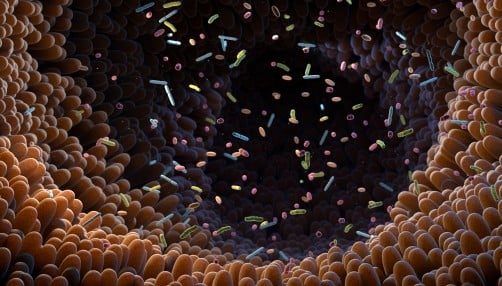Health
Babies’ Gut Bacteria Linked to Future Mental Health Risks

A recent study conducted by researchers at UCLA Health has found that the gut microbiome of infants may play a significant role in their emotional health as they grow. The research indicates that children with certain gut bacteria are at an increased risk of developing symptoms of depression and anxiety during middle childhood. This study underscores the potential long-term impact of early-life gut bacteria on mental health.
The study, published in the journal Nature Communications, highlights that children with a higher abundance of bacteria from the Clostridiales order and Lachnospiraceae family in their gut microbiome were more likely to experience internalizing symptoms, which encompass both anxiety and depression, by the age of 7.5 years. The researchers observed that the gut microbiome affects the communication pathways in the brain that are associated with emotional processing, suggesting a complex interplay between gut health and emotional well-being.
Linking Gut Bacteria to Brain Connectivity
The findings indicate that the composition of a child’s gut microbiome at an early age may influence brain connectivity related to emotional health. This connection was particularly noted in the brain regions that are critical for processing emotions. According to Dr. Bridget Callaghan, the senior author of the study, these results could reveal how gut microbes might shape the neural circuits involved in mental health during pivotal developmental stages.
Using data from the Growing Up in Singapore Towards Healthy Outcomes (GUSTO) study, the researchers analyzed stool samples from 55 children collected at age 2, alongside MRI brain scans taken at age 6. Caregivers also provided insights on their children’s behavioral issues at age 7.5. The analysis aimed to correlate early gut microbial profiles with brain connectivity patterns, which were then linked to later symptoms of anxiety and depression.
Implications for Future Research and Interventions
The association between specific gut bacteria and emotional health in children aligns with previous studies examining the gut-brain axis in adults. Notably, certain microbes within the Clostridiales and Lachnospiraceae populations have been connected to stress response and depression. Researchers believe that understanding these connections could lead to novel interventions aimed at improving mental health outcomes.
Dr. Callaghan emphasized the need for further experimental research to establish whether these gut microbiome associations are indeed causal. She noted that identifying the specific bacterial species responsible for these findings could open the door to practical approaches such as dietary changes or probiotics to help mitigate mental health issues in children.
This study was conducted in collaboration with several institutions, including the Agency for Science, Technology and Research (A*STAR), KK Women’s and Children’s Hospital, National University Health System (NUHS), and the National University of Singapore Yong Loo Lin School of Medicine.
As mental health challenges among children continue to be a pressing concern globally, this research highlights the importance of early-life health interventions and the potential for gut bacteria to influence emotional well-being in the years to come.
-

 Business2 weeks ago
Business2 weeks agoIconic Sand Dollar Social Club Listed for $3 Million in Folly Beach
-

 Politics2 weeks ago
Politics2 weeks agoAfghan Refugee Detained by ICE After Asylum Hearing in New York
-

 Health2 weeks ago
Health2 weeks agoPeptilogics Secures $78 Million to Combat Prosthetic Joint Infections
-

 Science2 weeks ago
Science2 weeks agoResearchers Achieve Fastest Genome Sequencing in Under Four Hours
-

 Lifestyle2 weeks ago
Lifestyle2 weeks agoJump for Good: San Clemente Pier Fundraiser Allows Legal Leaps
-

 Health2 weeks ago
Health2 weeks agoResearcher Uncovers Zika Virus Pathway to Placenta Using Nanotubes
-

 World2 weeks ago
World2 weeks agoUS Passport Ranks Drop Out of Top 10 for First Time Ever
-

 Business2 weeks ago
Business2 weeks agoSan Jose High-Rise Faces Foreclosure Over $182.5 Million Loan
-

 Science2 weeks ago
Science2 weeks agoMars Observed: Detailed Imaging Reveals Dust Avalanche Dynamics
-

 Entertainment2 weeks ago
Entertainment2 weeks agoJennifer Lopez Addresses A-Rod Split in Candid Interview
-

 World2 weeks ago
World2 weeks agoRegional Pilots’ Salaries Surge to Six Figures in 2025
-

 World2 weeks ago
World2 weeks agoObama Foundation Highlights Challenges in Hungary and Poland









